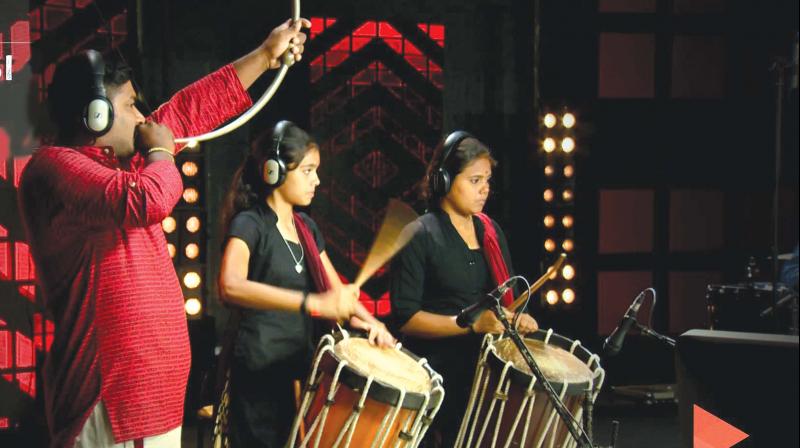Music in philisophies
Musician and sound designer Arun Varghese alias Varkey talks about his six originals featured in Kappa TV recently and his philosphies.

Arun Varghese lifts up his legs and turns the other way. Minutes into a conversation, he seems to have got comfortable. The mannerisms are casual, the look on his face is often distant. Not because he is distracted, his thoughts have a way of wandering into the philosophical. After school, he had taken a whole year to sit back and decide on a conflicting thought: should he work for income or knowledge. There were no what-will-I-do questions. It had always been music, ever since his mother Santhi Varghese, an art-lover and a former student of K.J. Yesudas's Tharangini music school, put him to it at a very early age. Arun learnt to know it all, instruments and vocals. Piano and keyboard stuck. Years later, he still seems unclear of the old question: money or knowledge, but he has finally got on a stage and brought out on a public venue six of his originals, with a band quickly put together under the name, Varkey & Friends. Varkey is he.
 Sooraj Santhosh
Sooraj Santhosh
"This is why I said I will write the answers, the questions could be complicated," he says, smiling, on asked what his background is. It may sound simple to another but to Arun who seems to be on Buddha's path but with slightly different questions, the word background can mean a lot of different things. Arun had to fight one part of himself to decide it is ok to put your songs at a place that others could access. After that one year of philosophical thoughts, Arun took off to A.R. Rahman's KM College of Music in Chennai. They tested him and let him skip a year. The last year had been in London, to finish an extension programme at Middlesex University.
 Arun Varghese
Arun Varghese
Back in Chennai, he worked with veteran musician Ouseppachan for various films and ads. Independently he composed for many short films including the new Fugue. His first work for a feature film came with Oraazhcha. He also worked with Bharatbala, director of Maryan, for documentaries.
Arun had also managed to pick up a new instrument — seaboard — and become part of a seaboard ensemble of Rahman's. He remembers interactions with the maestro who never said a negative comment, but encouraged Arun's mixing work. "We all want to be heard. Those who want to listen, will listen," Arun slips off to his philosophies again.
Brushing them off, he comes to his six compositions for Kappa. It had come through cinematographer Mahesh, who introduced him to Sumesh of Kappa. Arun has a story for all of his songs. Aarpo Irro is a soundscape based song on folk text adapted by his childhood friend Syam and himself, with original field recordings from Kuttanad. Njaan Kaalam, sung by Sooraj Santhosh, is a mix of a folk song and a poem by Syam. Chirayum Mungi describes the rain on paddy fields, Lelu Allu is a travel song, Puthiyoru Bhavam is an anthem for a better tomorrow. Moody Days, the only English song in the list, was composed when Arun was still at school.

